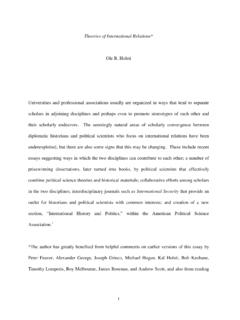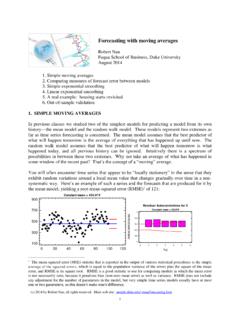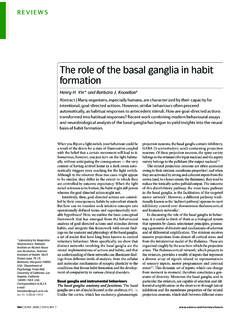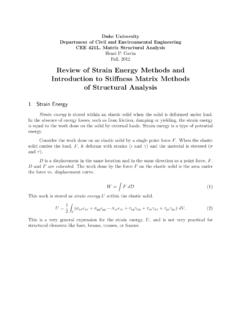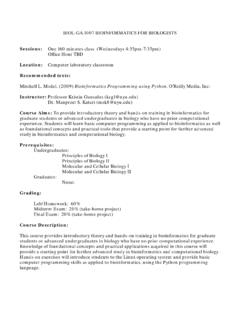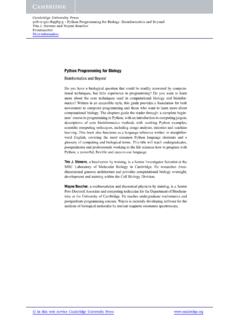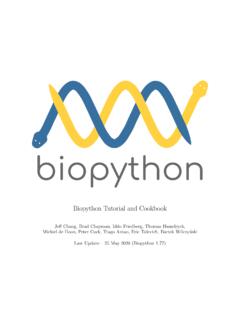Transcription of Practical Computing for Biologists - people.duke.edu
1 Practical Computing for BiologistsRelease ChanJune 01, 2012 CONTENTS1 Updates12 Introduction33 Course Description54 Instructor: Cliburn Chan, Biostatistics and Samples .. and introduction .. Unix Commands .. a text editor and regular expressions .. Computing and web page generation .. Basics I .. python Basics II .. python Modules .. NumPy and Matplotlib .. Biopython I .. Biopython II .. Data management and relational databases .. Data analysis with python .. Vector graphics with Inkscape .. Capstone Example.
2 98 Index105iiiCHAPTERONEUPDATES24 April 2012 Personal web space on the Duke servers is not turned on by default for DUMC perosnnel. However, ifyou make a request for AFS space to it will be available to you within 24 April 2012 The PCfB textbook is now available for collection for course participants at Room 120, Surgical Oncol-ogy Research Facility. Please read or at least scan the book before the workshop starts. There are also pre-workshopAssignmentsthat you will need to do. We will shortly be contacting course participants for data sets/repetitive tasksthat could serve as relevant demonstrations or examples of regular expression manipulation, programming or use ofrelational April 2012 The course is now fully subscribed, and new registrants will be placed on a wait list.
3 Please continue toregister if you are interested - if there is sufficient demand, we will plan for a second workshop. Thanks so much foryour enthusiasm and support!1 Practical Computing for Biologists , Release 1. UpdatesCHAPTERTWOINTRODUCTIONThe CFAR Biostatistics and Computational Biology Core is conducting afreefour-day workshop for Duke researchersto learn how to use the computer more effectively for scientific work. It is designed for people whoneed to work withlarge and complex data sets and suspect that there is a better and faster way to get their work done.
4 The coursewill use the textbookPractical Computing for Biologists (PCfB)by Steven Haddock and Casey Dunn, andCFAR isgenerously giving each participant a free copy of the book. The main intent of the course is to teach researchers howto use the Unix shell, the python programming language, databases and image manipulation tools to execute commonscientific chores. An OS X system is preferred since Macs provide a Unix command line natively. Windows userscan also participate by setting up Linux in an emulator (this is perfectly safe and instructions are given in thePCfBtextbook).
5 The course is designed for people trained in biology, andno previous Unix or programming experience is course will be limited to 12 participants and will be held at the Surgical Oncology Research Facility (SORF) BeardConference Room from 29 May 2012 to 1 June 2012. Please email if you have any enquiriesor wish to register for the course. Acceptance will be on a first-come first-serve basis, but CFAR investigators andtheir trainees will be given will contact course participants before the workshop starts to collect your copy ofPractical Computing for Biolo-gists.
6 To make it relevant for your needs, participants will also be asked to suggest computational tasks that you wouldlike to automate or simplify, as well as to contribute data sets that are tedious to preprocess and filter manually. Wewill try to work these examples into the demonstrations or class assignments if at all possible. Updates and coursematerials will be posted at ~ccc14/pcfb/.3 Practical Computing for Biologists , Release 2. IntroductionCHAPTERTHREECOURSE DESCRIPTION29 May 2012 (Tuesday)AM: Software installation and working with text editors. We will install the TextWrangler editor (jEdit for Linuxusers), the Enthought python distribution (Academic license), ImageMagick, ImageJ, MySQL Community Server andMySQL Workbench.
7 Participants are expected to install the software ahead of the workshop following instructions inPCfB, but help and troubleshooting will be provided in the morning session if necessary. Many operations on largefile sets, especially for text data, are performed much more efficiently from the command line than from a graphicalinterface. We will learn how to open a Terminal, and perform text processing, access material from the web, and writesimple shell scripts to automate common and introductionBasic Unix commandsPM: We will learn to use the TextWranger/jEdit editor to understand the basics of regular expressions, and how toreformat text using regular expressions.
8 TextWrangler/jEdit will also be used to develop programs from Day 2. Wewill also learn to transfer and synchronize files with remote computers from the command line, or run programs onremote computers using the command line (ssh)). We will conclude by showing how to construct a simple homepageusing Sphinx and upload it to the Duke a text editor and regular expressionsRemote Computing and web page generation30 May 2012 (Wednesday)AM: Day 2 introduces you to the python programming language, a modern dynamic language that is (relatively) easyto learn. The morning session will introduce you to the powerful IPython interpreter, where you will test out codesnippets with instant feedback, and learn about the python documentation and help system.
9 We wil then move on toPython scripting, including decisions and loops, reading from and writing to files, and writing your own Basics IPython Basics IIPM: The afternoon will introduce you to the most useful python modules in the standard library, followed by anintroduction to the NumPy module for numerical work, and Matplotlib for ModulesNumPy and Matplotlib31 May 2012 (Thursday)AM: You will learn more about Numpy and Matplotlib, together with how to use the Biopython module for sequencand array analysis, as well as how to access the NCBI databases I5 Practical Computing for Biologists , Release IIPM: The afternoon starts with an introduction to relational databases and how to query them using SQL, then concludeswith some intermediate examples of using python for data analysis and statistical management and relational databasesIData analysis with Python01 June 2012 (Friday)AM.
10 On the final day, we will have a tutorial for how to create scientific diagrams using the vector illustration programInkscape. The course will conclude with working through developing a moderately complex python program to parse,summarize and display data from a cytokine assay graphics with InkscapeCapstone example6 Chapter 3. Course DescriptionCHAPTERFOURINSTRUCTOR: CLIBURN CHAN,BIOSTATISTICS is a computational biologist whose main research interest is in data analysis and modeling of immune re-sponses. He teaches the Introduction to the Practice of Biostatistics I & II courses for the Duke Masters in Biostatisticsprogram, and has been programming in python for over a decade.
